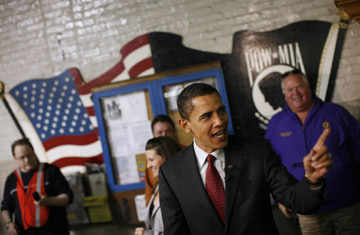
Democratic presidential candidate Barack Obama tours a General Motors plant in Janesville, Wisconsin on February 13, 2008
Does Barack Obama have a class problem? He routinely demolishes Hillary Clinton among upper-middle-class "wine" Democrats. Among white working-class "beer" Democrats, however, he sometimes struggles. Traditionally, in Democratic contests, hops trump grapes: Walter Mondale beat Gary Hart in 1984, Bill Clinton beat Paul Tsongas in 1992, Al Gore beat Bill Bradley in 2000, and John Kerry beat Howard Dean in 2004--all by winning big among the Budweiser set. If Obama wins the nomination, he'll have done so with the most upscale coalition since Michael Dukakis' in 1988 or maybe even George McGovern's in 1972. Both Dukakis and McGovern got trounced in November; if Obama becomes the nominee, will liquor impair the Democrats once again?
Probably not. One reason is changing demographics. Minorities and upscale professionals--the Obama coalition--constitute a much larger share of the population than they did several decades ago. In 1972 blacks, Hispanics and Asians composed 10% of the American electorate; by 2006 they were 21%. When McGovern won these groups, it barely made a dent. But if Obama does--and with Hispanics trending hard toward the Democrats, he probably will--he'll get a much bigger boost. The other half of Obama's coalition--college-educated whites--has also been growing fast. As John Judis and Ruy Teixeira noted in their prescient 2002 book, The Emerging Democratic Majority, professionals now make up almost 20% of the American workforce, far more than in 1972. This fall, for the first time in memory, blue-collar whites may not constitute a majority at the polls.
To be sure, if the hard-hat white Democrats who are backing Clinton in the primaries stampede to John McCain in November, Obama will be in trouble no matter how many computer programmers he wins. That's what happened to McGovern and Dukakis, neither of whom cracked 40% among blue-collar whites.
But a lot has changed since then. In the '70s and '80s, beer Democrats were easy pickings for Republicans. In 1972 they detested McGovern's amnesty plan for Vietnam draft dodgers and his support for forced busing. After McGovern won the nomination, the Teamsters, longshoremen and construction-workers unions refused to back him. Something similar happened in 1988, when white working-class Democrats couldn't stomach Dukakis' opposition to the death penalty. In both years, the primaries exposed bitter ideological divisions that came back to haunt the party in November. In 1972 Democrat Henry (Scoop) Jackson, in his bid for blue-collar primary votes, called McGovern the candidate of "amnesty, acid and abortion"--a line that Richard Nixon borrowed to devastating effect. In 1988 it was a young Al Gore who first brought up Dukakis' furlough program for convicted murderers in Massachusetts, a program that George H. W. Bush infamously associated with Willie Horton.
This year, by contrast, the issues that once split the Democrats along race and class lines--the death penalty, welfare and affirmative action--have virtually disappeared. On foreign policy, blue-collar Dems have grown as tired of the Iraq war as have their upscale counterparts. And downscale white Democrats simply aren't as conservative as they were in the Archie Bunker days. During Vietnam, Chicago mayor Richard J. Daley--the quintessential lunch-pail Democrat--sent cops to bust the heads of hippie protesters. Today his son, Chicago mayor Richard M. Daley, opposes the Iraq war, promotes environmentalism and marches in gay-pride parades.
In fact, this year's deeper class divide is among Republicans. The party's blue-collar base is furious over illegal immigration and has begun to notice that the GOP's business wing is keeping the borders porous. McCain, whose position on immigration is more chamber of commerce than Lou Dobbs, may get caught in the cross fire, with nativist Republicans opting for a third party or simply staying home. All of which suggests that the media's fretting about beer and wine Democrats is misplaced. The party that's likely to have trouble holding its liquor this fall is the GOP. n
Beinart is a TIME columnist and senior fellow at the Council on Foreign Relations
